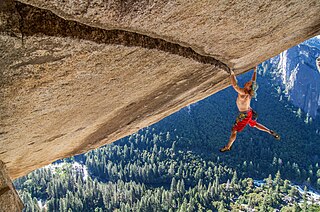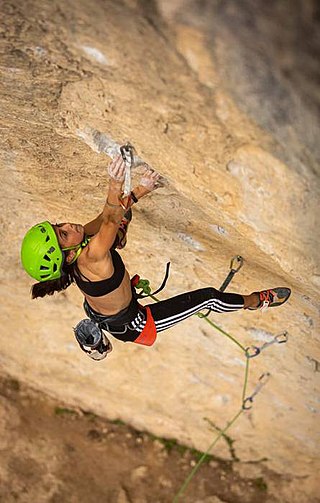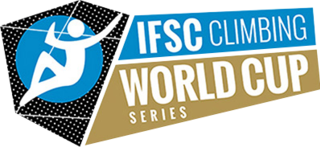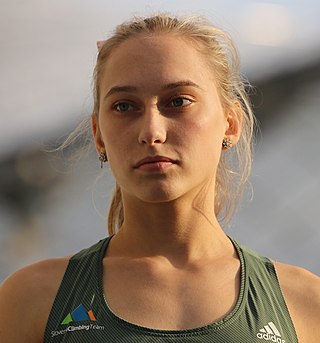
Climbing is the activity of using one's hands, feet, or other parts of the body to ascend a steep topographical object that can range from the world's tallest mountains to small boulders. Climbing is done for locomotion, for sporting recreation, for competition, and is also done in trades that rely on ascension; such as rescue and military operations. Climbing is done indoors and outdoors, on natural surfaces, and on artificial surfaces.

Lead climbing is a technique in rock climbing where the lead climber clips their rope to the climbing protection as they ascend the climbing route, while their second remains at the base of the route belaying the rope to protect the lead climber in the event that they fall. The term is used to distinguish between the two roles, and the greater effort and increased risk, of the role of the lead climber.

In the history of rock climbing, the three main sub-disciplines—bouldering, single-pitch climbing, and big wall climbing—can trace their origins to late 19th-century Europe. Bouldering started in Fontainebleau, and was advanced by Pierre Allain in the 1930s, and John Gill in the 1950s. Big wall climbing started in the Dolomites, and was spread across the Alps in the 1930s by climbers such as Emilio Comici and Riccardo Cassin, and in the 1950s by Walter Bonatti, before reaching Yosemite where it was led in the 1950s to 1970s by climbers such as Royal Robbins. Single-pitch climbing started pre-1900 in both the Lake District and in Saxony, and by the 1970s had spread widely with climbers such as Ron Fawcett (Britain), Bernd Arnold (Germany), Patrick Berhault (France), Ron Kauk and John Bachar (USA).
The IFSC Climbing World Championships are the biennial world championship event for competition climbing that is organized by the International Federation of Sport Climbing (IFSC). This event determines the male and female world champions in the three disciplines of sport climbing: lead climbing, bouldering, and speed climbing. Since 2012, a Combined ranking is also determined, for climbers competing in all disciplines, and additional medals are awarded based on that ranking. The first event was organized in Frankfurt in 1991.

The IFSC Climbing World Cup is a series of competition climbing events held during the year at various locations around the world, organized by the International Federation of Sport Climbing (IFSC). At each event, the athletes compete in three disciplines: lead, bouldering, and speed. The number of events varies from year to year, and the winners for each discipline are decided by the points accumulated in the year.

Janja Garnbret is a Slovenian rock climber and sport climber who has won multiple lead climbing and bouldering events at climbing competitions. In 2021, she became the first ever female Olympic gold medalist in sport climbing, and is widely regarded as one of the greatest competitive climbers of all time. She is also the world's first-ever female climber to onsight an 8c (5.14b) graded sport climbing route. As of the end of 2022, Garnbret had won the most IFSC gold medals of any competitive climber in history.

Sport climbing made its Olympic debut at the 2020 Summer Olympics in Tokyo, Japan. Two events were held, one each for men and women. The format controversially consisted of one combined event with three disciplines: lead climbing, speed climbing and bouldering. The medals were determined based on best performance across all three disciplines. This format was previously tested at the 2018 Summer Youth Olympics. The Olympic code for sports climbing is CLB.

Margo Hayes is an American professional rock climber from Boulder, Colorado. In 2016, she won both the Bouldering and Lead Climbing events at the World Youth Championships in Guangzhou (China). In 2017, she became the first woman in history to climb a 9a+ (5.15a) graded route.

The 2018 season of the IFSC Climbing World Cup was the 20th season of the competition. Bouldering competitions were held at seven stops of the IFSC Climbing World Cup. The bouldering season began on April 13 at the World Cup in Meiringen, and concluded on 18 August with the World Cup in Munich. At each stop a qualifying was held on the first day of the competition, and the semi-final and final rounds are conducted on the second day of the competition. The winners were awarded trophies, and the best three finishers received medals. At the end of the season an overall ranking was determined based upon points, which athletes were awarded for finishing in the top 30 of each individual event. Jernej Kruder won the seasonal title in the men's competition and Miho Nonaka won the women's. Japan won the national team competition.

The 2018 IFSC Climbing World Championships, the 15th edition, were held in Innsbruck, Austria from 6 to 16 September 2018. The championships consisted of lead, speed, bouldering, paraclimbing, and combined events.
The 2017 IFSC Climbing World Cup was held in 15 locations. Bouldering competitions were held in 7 locations, lead in 8 locations, and speed in 7 locations. The season began on 7 April in Meiringen, Switzerland and concluded on 12 November in Kranj, Slovenia.
The 2018 IFSC Climbing World Cup was held in 14 locations. There were 22 events: 7 bouldering, 7 lead, and 8 speed events. The season began on 13 April in Meiringen, Switzerland, and concluded on 28 October in Xiamen, China.
The 2019 season of the IFSC Climbing World Cup was the 21st season of the competition. Bouldering competitions were held at six stops of the IFSC Climbing World Cup. The bouldering season began on April 5 at the World Cup in Meiringen, and concluded on June 8 with the World Cup in Vail. At each stop a qualifying was held on the first day of the competition, and the semi-final and final rounds were conducted on the second day of the competition. The winners were awarded trophies, and the best three finishers received medals. At the end of the season an overall ranking was determined based upon points, which athletes were awarded for finishing in the top 30 of each individual event.
The 2019 IFSC Climbing World Cup was held in 12 locations. Bouldering, lead and speed competitions were each held in 6 locations. The season began on 5 April in Meiringen, Switzerland with the first bouldering competition in the season, and concluded on 27 October in Inzai, Japan, with the last lead climbing competition in the season.

This is a ranking of total career IFSC victories obtained in the annual IFSC Climbing World Cup and the biennial IFSC Climbing World Championships, which were organized by the International Climbing and Mountaineering Federation, and the International Federation of Sport Climbing.
The 2019 Combined Slovenian Championships were the first Slovenian national championships for competition climbing in combined format. It was held in Celje, Slovenia from 14 to 16 June 2019. The athletes competed in speed, bouldering, and lead disciplines, and the combined results of those disciplines would determine the winners. The winner for men was Jernej Kruder and for women was Janja Garnbret.

Ai Mori is a Japanese professional rock climber, sport climber and boulderer. At the 2019 IFSC Climbing World Championships, she became the youngest Japanese athlete to finish in a podium place in the competition, third in lead. She has won Japan Cup titles in both bouldering and lead disciplines, and has multiple IFSC Climbing World Cup podium finishes, including three gold medals in World Cup events in 2022.

Natalia Grossman is an American professional rock climber. She represents the United States at IFSC Climbing World Cup in bouldering and lead. She won a gold and a silver medal at the 2021 IFSC Climbing World Championships and has 14 podium finishes at Climbing World Cup events, including seven gold medals.
The 2021 IFSC Climbing World Cup was the 33rd edition of the international sport climbing competition series, held in seven locations. There are 11 events: four bouldering, five lead, and two speed events. The season began on 16 April in Meiringen, Switzerland with the first bouldering competition in the season, and concluded on 4 September in Kranj, Slovenia. The International Federation of Sport Climbing had initially scheduled 18 events concluding on 31 October, but COVID-19 travel restrictions resulted in the cancellation of events in Xiamen and Wujiang in China, Jakarta in Indonesia and Seoul in South Korea.
The 2022 IFSC Climbing World Cup is the 34th edition of the international sport climbing competition series organised by the International Federation of Sport Climbing (IFSC), held in 12 locations. There are 21 events: six bouldering, seven lead, seven speed, and one bouldering & lead combined events. The series began on 8 April in Meiringen, Switzerland with the first bouldering competitions of the season, and concluded on 22 October in Morioka-Iwate, Japan, which introduced the Boulder & Lead combined format that will be used at the 2024 Summer Olympics in Paris.




















